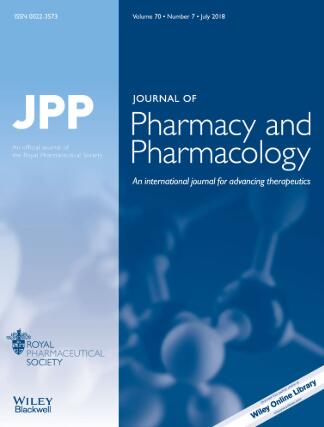用PNU120596靶向PI3K/AKT信号通路可预防LPS诱导的急性肺损伤
IF 2.8
4区 医学
Q2 PHARMACOLOGY & PHARMACY
引用次数: 0
摘要
目的 本研究探讨了 PNU120596(一种α7烟碱乙酰胆碱受体(α7nAChR)的正异位调节剂)在减轻小鼠模型中脂多糖(LPS)诱导的急性肺损伤(ALI)方面的潜在治疗效果。具体而言,我们试图研究 PNU120596 在 ALI 情况下对 PI3K/AKT 信号通路的影响。方法 通过 LPS 给药诱导小鼠发生 ALI,并评估 PNU120596 的保护作用。对肺损伤、肺功能和炎症反应进行了评估。此外,还检测了 PI3K/AKT 信号通路的激活情况以及炎症因子和氧化应激标记物的水平。主要发现 在 ALI 小鼠模型中,PNU120596 能明显改善 LPS 诱导的肺损伤、改善肺功能并减轻炎症反应。此外,我们还观察到 PNU120596 可抑制 PI3K/AKT 信号通路的激活,这与炎症因子和氧化应激标志物水平的降低有关。结论 PNU120596 可通过靶向 PI3K/AKT 信号通路治疗急性肺损伤,具有良好的治疗潜力。这些研究结果表明,用 PNU120596 调节 α7 尼古丁乙酰胆碱受体可能是治疗 ALI 的一种可行策略,值得进一步研究和临床应用。本文章由计算机程序翻译,如有差异,请以英文原文为准。
Targeting the PI3K/AKT signaling pathway with PNU120596 protects against LPS-induced acute lung injury
Objectives This study investigated the potential therapeutic benefits of PNU120596, a positive allosteric modulator of the α7 nicotinic acetylcholine receptor (α7nAChR), in mitigating acute lung injury (ALI) induced by lipopolysaccharide (LPS) in a mouse model. Specifically, we sought to examine the impact of PNU120596 on the PI3K/AKT signaling pathway in the context of ALI. Methods ALI was induced in mice by LPS administration, and the protective effects of PNU120596 were assessed. Lung injury, lung function, and the inflammatory response were evaluated. Additionally, the activation of the PI3K/AKT signaling pathway was examined, along with the levels of inflammatory factors and oxidative stress markers. Key findings PNU120596 significantly ameliorated LPS-induced lung injury, improved lung function, and reduced the inflammatory response in the mouse model of ALI. Furthermore, we observed that PNU120596 inhibited the activation of the PI3K/AKT signaling pathway, which was associated with decreased levels of inflammatory factors and oxidative stress markers. Conclusions PNU120596 exhibits promising therapeutic potential for the treatment of acute lung injury, potentially by targeting the PI3K/AKT signaling pathway. These findings suggest that modulation of the α7 nicotinic acetylcholine receptor with PNU120596 may offer a viable strategy for the management of ALI, warranting further investigation and potential clinical applications.
求助全文
通过发布文献求助,成功后即可免费获取论文全文。
去求助
来源期刊
CiteScore
6.60
自引率
0.00%
发文量
91
审稿时长
3 months
期刊介绍:
JPP keeps pace with new research on how drug action may be optimized by new technologies, and attention is given to understanding and improving drug interactions in the body. At the same time, the journal maintains its established and well-respected core strengths in areas such as pharmaceutics and drug delivery, experimental and clinical pharmacology, biopharmaceutics and drug disposition, and drugs from natural sources. JPP publishes at least one special issue on a topical theme each year.

 求助内容:
求助内容: 应助结果提醒方式:
应助结果提醒方式:


